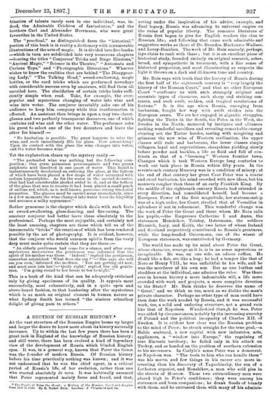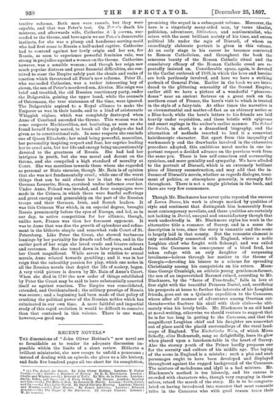A SECTION OF RUSSIAN HISTORY.*
As the vast structure of the Russian Empire looms up larger and larger the desire to know more about its history naturally increases. Up to within the last few years there has been a great lack in England of the knowledge of Russian history ; and still worse, there has been evolved a kind of legendary view of the development of Russia which blinded English eyes. It was, in a general way, known that Peter the Great was the founder of modern Russia. Of Russian history before his time practically nothing was known; and it was not understood that he was the chief agent, in a critical period of Russia's life, of her evolution, rather than one who started absolutely de novo. It was habitually assumed that Peter represented mainly force and fraud, and that, • The Pupils of Peter the Great: a History of the Russian Court and Empire from 1697 to 1740. By R. Nisbet Bain. London • nenatable and Co. acting under the inspiration of his advice, example, and final legacy, Russia was advancing to universal empire on the ruins of popular liberty. The romance literature of Russia first began to give for English readers the clue to Russian life ; and following that came such admirable and suggestive works as those of Dr. Brandes, Mackenzie Wallace, and Leroy-Beaulieu. The work of Mr. Bain scarcely, perhaps, lays claim to rank with these ; but it is an excellent piece of historical study, founded entirely on original research, sober, broad, and sympathetic in treatment, with a fine sense of historical proportion, and most illuminating as respects the light it throws on a dark and ill-known time and country.
Mr. Bain says with truth that the history of Russia during the first half of the eighteenth century is " very largely the history of the Russian Court," and that no other European Court " confronts us with such strangely original and eccentric types of character, such sharp and striking con- trasts, and such swift, sudden, and tragical revolutions of fortune." It is the age when Russia, emerging from barbarism, fought her way with swift strides into the European arena. We see her engaged in gigantic struggles, fighting the Turks in the South, the Poles in the West, the Swedes in the North, menaced by intrigues and alliances making wonderful sacrifices and revealing remarkable energy clearing out the Tartar hordes, tasting with misgiving and grimaces the new wine of Western civilisation, the upper classes still rude and barbarous, the lower classes simple villagers, loyal and superstitious, sheepskins yielding slowly before powder and buckles, a life as fluid and full of con- trasts as that of a " booming " Western frontier town. Changes which it took Western Europe long centuries to work out took place in Russia within fifty years. In the seventeenth century Muscovy was in a condition of misery; at the end of that century her great Czar Peter was a coarse and cruel barbarian, his mind crowded with new ideas, but his manners rougher than those of an early Frankish King. By the middle of the eighteenth century Russia had extended in every direction, had consolidated herself, had become a European Power of the first magnitude, her statesmanship was of a high order, her Court rivalled that of Versailles in splendour if not in refinement. This wonderful change was the work of Peter the Great and those whom Mr. Bain calls his pupils,—the Empresses Catherine L and Anne, the statesmen Menshikov, Tolstoy, Osterman, the soldiers Miinnich, Lacy, and Keith, the two latter of whom Ireland and Scotland respectively contributed to Russia's greatness, while the long-headed Ostermann, one of the wisest of European statesmen, was contributed by Germany.
The world has made up its mind about Peter the Great, whose character, strange as it is, is in no sense mysterious or inexplicable. He was, on one side, an odious ruffian. He drank like a fish, ate like a hog ; be had a temper like that of Nero or Henry VIII., he was unfaithful to his wife, and he was the murderer of his own son. But as one loathes and shudders at the individual, one admires the ruler. Was there ever in human history a more indomitable will, a life more crowded with work and projects, a more complete devotion to the State ? Mr. Bain thinks he deserves the name of " Great," and we think so too, much as we dislike the man's private character. Perhaps no other type of man could have then done the work needed by Russia, and it was successful work, too, a solid and enduring structure, not a grand ruin like that of Napoleon. Wunderkind thou4h he was, Peter was aided by circumstances, notably by the increasing anarchy of Poland and the political incapacity of Charles XII. of Sweden. It is evident how clear was the Russian problem to the mind of Peter; he struck straight for the true goal,—a Baltic seaboard, a new capital with new industries, arts, appliances, a " window into Europe," the regaining of true Slavonic territory ; he failed only in his attack on Turkey, and so handed on the problem of southern extension to his successors. In Ca.rlyle's sense Peter was a democrat, as Napoleon was. " The tools to him who can handle them " was his motto, and few things in his career are more in- teresting than his discovery of Yaguzhinsky, the son of a Lutheran organist, and Menshikov, a man who sold pies in the streets of Moscow. These two extraordinary men were placed high in Peter's confidence ; they were among his statesmen and boon companions ; he drank floods of brandy with them, and he entrusted them with many of his adminia.
trative reforms. Both men were rascals, but they were capable, and that was Peter's test. On Pet'r's death his mistress, and afterwards wife, Catherine A'. k yeevna, suc- ceeded to the throne, and here again we see Peter's democratic instincts, for she was a plump and handsome serving-maid who had first come to Russia a half-naked captive. Catherine had to contend against her lowly origin and her sex, for Russia, so soon to experience powerful feminine rule, was strong in prejudice against a woman on the throne. Catherine, however, was a sensible woman ; and though her reign saw much popular distress and great financial difficulties, she con- trived to steer the Empire safely past the shoals and rocks of reaction which threatened all Peter's new reforms. Peter II., who succeeded Catherine, was a. rather interesting boy of eleven, the son of Peter's murdered son, Alexia& His reign was brief and troubled, the old Russian reactionary party, under the Dolgorukis, gaining the upper hand, while the counsels of Ostermann, the true statesman of the time, were ignored. The Dolgorukis aspired to a Royal alliance to make the Emperor as wax in their hands, and to a kind of aristocratic Whiggish regime, which was completely destroyed when Anne of Courland ascended the throne. This woman was in some respects Machiavellian, not hesitating, as soon as she found herself firmly seated, to break all the pledges she had given as to constitutional role. In some respects she reminds one of Queen Elizabeth ; her mind being powerful, masculine, her personality inspiring respect and fear, her caprice leading her to cruel acts, but her life and energy being unquestionably devoted to the greatness of Russia. She had had her intrigues in youth, but she was moral and decent on the throne, and she compelled a high standard of morality at Court. She was merciless towards those whom she regarded as personal or State enemies, though Mr. Bain is of opinion that she was not fundamentally cruel; while one of the worst things that can be said about her is that the worthless German favourite, Biren, exercised undue influence over her. Under Anne, Poland was invaded, and four campaigns were made in the Crimea, in which there were fearful sufferings and great energy and generalship on the part of the Russian troops and their German, Irish, and Scotch leaders. It was this Crimean War which, in an especial degree, brought Russia prominently before the eyes of Europe, and led, as in our day, to active competition for her alliance, though, unlike now, France was then her foremost opponent. It was to Anne that was due the growth of splendour and refine- ment in the hitherto simple and somewhat rude Court of St. Petersburg. Like Peter the Great, she showed barbarous leanings by her partiality for dwarfs and buffoons, and in the earlier part of her reign she loved crude and bizarre colours and costumes. But she toned down in later years, and made her Court magnificent. While severe in relation to sexual morals, Anne relaxed towards gambling ; and it was in her reign that the unhealthy passion for play, which one notes in all the Russian novels that depict the life of society, began. A very vivid picture is drawn by Mr. Bain of Anne's Court. When she died in 1740 the new order of things established by Peter the Great may be said to have substantially asserted itself as against reaction. The Empire was consolidated, extended, and Occidentalised ; the military prestige of Russia was secure; and a beginning had been made of that policy of crushing the political power of the Russian nobles which has culminated in our own time. A more faithful and impartial study of this rapid evolution it would be difficult to conceive than that contained in this volume. There is one want, however,—a good map.



































 Previous page
Previous page